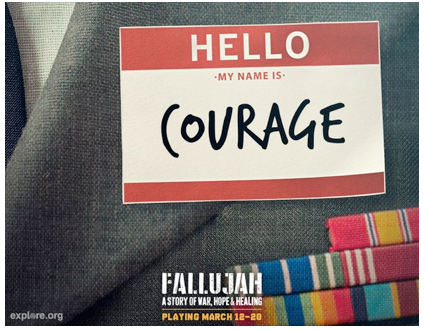CommentsGELFAND’S WORLD--Being so damaged by the horrible memories of combat that you numb yourself with alcohol or try to take your own life … that's something that most of us don't understand. We haven't experienced our closest friends being shot to death in front of us, or endured the nightmares and depression that come from the grief and the guilt. But to a number of veterans of the Iraq War, these things are very real. The medical profession calls it PTSD, or post-traumatic stress disorder. Surely this is an inadequate set of words for the level of suffering that it represents. What used to be called shell shock and now is called PTSD is a syndrome that has resulted in broken lives and a substantial number of suicides among U.S. military veterans.
The genesis of a new opera born out of an exploration of PTSD
One Iraq War veteran by the name of Christian Ellis survived his own repeated suicide attempts and, during his extended therapy, met up with someone who asked him the traditional question, "What would you do if you could do anything you wanted?" Ellis explains that he joked, "Write an opera." He didn't realize at the time that Charles Annenberg Weingarten not only was interested in the answer Ellis gave, he also had the means to start the process that has resulted in the opera Fallujah. Ellis didn't actually write his own opera, but he had an opera written about him. It opens in Long Beach on March 12.
Ellis was put together with writer Heather Raffo. She is an unusual combination in the opera world, having one Iraqi parent, having herself lived in Iraq for a number of years, and also being a talented playwright. She wrote the words that were set to music by composer Tobin Stokes.
Last weekend, the Long Beach Opera company previewed excerpts from Fallujah and also had veterans including Christian Ellis talk about their experiences in combat and how it affects their current lives. The panel was held on March 20, fittingly enough at the VA Medical Center, Long Beach.
The historical background
The Battle of Fallujah, or technically speaking. the Second Battle of Fallujah, has been described as the most intense urban battle of the war. Fought in the last part of 2004, it involved house to house combat. It went on for weeks. When you read the historical accounts, you find that Fallujah was a comparatively small version of the pitched battles of the world wars, but it was of comparable intensity to those who fought in it. It serves in the literary context as representative of all wars, and also stands for the experiences of this generation not only in Fallujah, but also in other battles.
Using art as therapy for PTSD
The panel discussion at the VAMC included Christian Ellis and two other veterans of Iraq, Michael Hebert and Jon Harguindeguy. Hebert and Harguindeguy are themselves PTSD survivors who have a passion for art and also find in it some measure of therapeutic release. Hebert's painting with the words Fallujah never fades is a particularly striking glimpse into the feelings of one vet. Harguindeguy's depiction of the open mouth of a commander -- drawn mainly as teeth and tongue -- is pretty much unique in depicting the experience of being ordered about under circumstances that require almost inhuman self-control.
Besides having obvious talents, these artist-vets are both involved in programs that provide veterans the chance to draw and paint. Doing art seems to help some of the veterans to open up and begin talking about their own difficulties.
Comments by panelists and also by one audience member suggested the surprising assertion that doing art may be a potential counterbalance to the experience of war or to stress in general. The audience member gave the example of Japanese samurai, who learned artistic skills in advance of becoming warriors.
The opera itself as artful therapy
Like Greek tragedies, opera can provide catharsis. This opera, as described by one of the cast members, is intended to do just that.
The presentation at the VA included excerpts from the opera sung by those who will star in the world premiere. It's not possible for me to do a thorough review of the opera at the moment because I haven't seen it in the entirety, but what I did see and hear is strangely beautiful and also sadly emotional with bits of hope. At least two of the LBO panelists and members of the cast and audience were visibly affected, and this just from short musical excerpts.
Long Beach Opera provides its own discussion which includes the following synopsis:
Fallujah follows mothers and sons as they search for hope and healing in the aftermath of a war that changed their relationships forever. The opera provides a glimpse inside real hearts and minds before and after one of the Iraq War’s biggest battles. The result is an inspiring, mind-opening, and moving opera by Canadian composer, Tobin Stokes and award-winning Iraqi American playwright, Heather Raffo.
A recurring theme expressed by the panelists was guilt. How does a normal person deal with the fact that he was ordered to do terrible things and did them? It was obvious that some audience members had similar thoughts, as the killing was done in all our names. The theme was subtly evoked near the end of the discussion when the moderator opened the presentation to audience questions, but first asked what questions were off limits.
The answer: "Don't ask us how many people we killed."
Each generation signifies its own wars with art and music. Fallujah adds to this cultural history.
Bob Gelfand writes on culture and politics for City Watch. He can be reached at [email protected]
Sidebar
Our mission is to promote and facilitate civic engagement and neighborhood empowerment, and to hold area government and its politicians accountable.

 CityWatch Los Angeles
Politics. Perspective. Participation.
CityWatch Los Angeles
Politics. Perspective. Participation.
24
Tue, Feb














